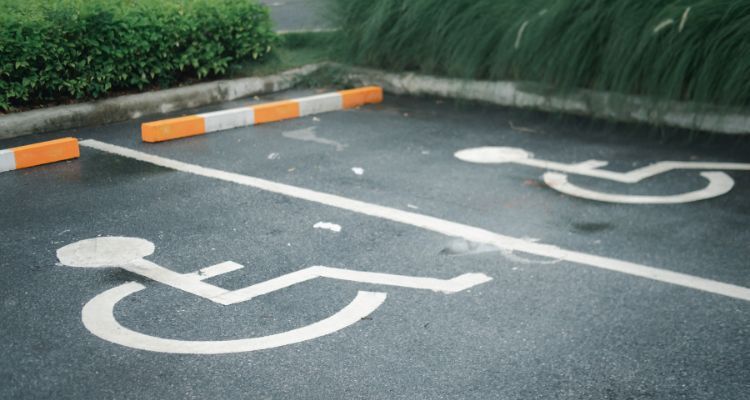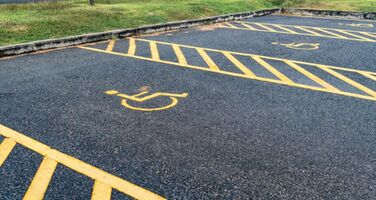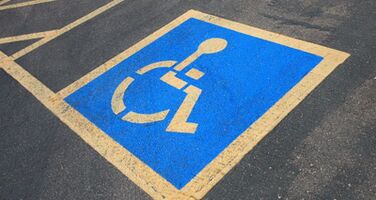
Handicap Placard vs. Handicap License Plates: Which is Right for You in Virginia?
Navigating the complexities of accessible parking options in VA can be challenging, especially when deciding between a disability tag and disability license plates. Both options provide critical benefits for individuals with disabilities, ensuring they have access to parking spaces that accommodate their needs. However, choosing the right option requires an understanding of the differences, eligibility requirements, application processes, and the specific advantages of each.
This comprehensive guide will explore the distinctions between handicap placards and handicap license plates in Virginia, helping you make an informed decision that best suits your needs or those of your loved ones.
Understanding the Basics: What are Placards and License Plates?
In VA, individuals with qualifying disabilities have the option to apply for either a disability tag (also known as a placard) or disability license plates. Both are designed to ensure that individuals with disabilities have access to designated parking spaces close to building entrances, reducing the physical strain that can be associated with parking further away.
Disability Tag (Placard): A disability tag is a removable tag that hangs from the rearview mirror of a vehicle. It is portable and can be used in any vehicle in which the individual with the disability is traveling. This flexibility makes it an ideal choice for individuals who frequently travel in different vehicles, such as those who do not own a car or who are passengers in multiple cars.
Disability License Plates: Disability license plates, on the other hand, are issued to a specific vehicle and are attached to that vehicle's front and rear. These plates feature the universal symbol of accessibility (a wheelchair symbol) and grant the same parking privileges as a disability tag. Unlike the tag, the license plates cannot be transferred between vehicles.
Key Differences Between Permits and License Plates
While both options grant access to accessible parking, they have distinct differences:
- Transferability: Tags are portable and can be used in multiple vehicles, whereas plates are specific to one vehicle.
- Duration: Tags are typically renewed every few years, while plates remain until the vehicle changes ownership or registration details.
- Visibility and Use: Tags must be hung and removed each time, while plates are always visible.
Eligibility Requirements for Disabled Permits and License Plates in Virginia
Before applying for a disability tag or disability license plates, it is crucial to understand the eligibility criteria set forth by the Virginia Department of Motor Vehicles (DMV). The requirements are designed to ensure that only those with genuine needs receive these benefits.
Eligibility Criteria:To qualify for a disability tag or disability license plates in VA, an individual must have a disability that limits or impairs their ability to walk. This can include conditions such as:
- The inability to walk 200 feet without stopping to rest.
- The need to use a wheelchair, cane, crutch, prosthetic device, or other assistive devices.
- Severe lung disease or requiring portable oxygen.
- A cardiac condition classified as Class III or IV by the American Heart Association.
- Severe limitations due to an arthritic, neurological, or orthopedic condition.
A licensed physician, nurse practitioner, physician assistant, podiatrist, or the Veterans Administration must certify these conditions.
Additional Requirements for License Plates
Applicants for disability license plates must be the vehicle’s registered owner or have joint ownership. Proof of disability is required, often in the form of a physician’s certification.
Temporary vs. Permanent Tags and Plates
In VA, temporary disability tags are available for individuals with short-term conditions, such as post-surgery recovery. These are typically valid for up to six months. Permanent tags and plates, however, are issued for long-term or lifelong conditions.
Application Process for Handicap Placards in VA
Required Forms and Documentation
To apply for a handicap permit in VA, you must submit the following:
- Application for Persons with Disabilities Parking Placard or Plates (MED 10): This form must be completed by the applicant and certified by a licensed healthcare provider.
- Valid Identification: This can include a VA driver’s license or other state-issued ID.
- Physician’s Certification: A licensed physician must confirm the applicant’s disability status.
Where to Submit the Application
The application can be submitted in person at any VA DMV office or by mail. Be sure to include all required documentation to avoid processing delays.
Application Fee and Processing Time
There is no fee for a permanent disability tag, but there may be a small fee for temporary tags. The processing time can range from a few days to a few weeks, depending on the volume of applications.
Application Process for Handicap License Plates in VA
Step-by-Step Guide to Applying for Disability Plates
Applying for a disability license plate involves a more detailed process compared to a tag. Here’s a step-by-step guide:
- Complete the MED 10 Form: As with tags, this form must be completed and signed by a healthcare provider.
- Vehicle Registration Information: Ensure the vehicle is properly registered in the applicant’s name.
- Submit the Application: The completed form can be submitted to the DMV along with the current vehicle registration and applicable fees.
Fees and Renewal
The fees for disability license plates are typically the same as standard registration fees. Renewals are handled along with the vehicle’s registration, making it a seamless process for long-term users.
Processing Time and Delivery
Once approved, the disability license plates will be mailed to the applicant’s address within 4-6 weeks. During this period, a temporary plate may be provided.
Temporary vs. Permanent Disabled Permits and Plates
VA offers both temporary and permanent options for disability tags and disability license plates, depending on the nature of the applicant’s disability.
Temporary Disability Tag:
- Validity: Typically valid for up to six months, depending on the physician’s certification.
- Renewal: Can be renewed if the disability persists, with additional medical certification required.
- Use Case: Ideal for individuals with temporary disabilities, such as those recovering from surgery or injury.
Permanent Disability Tag:
- Validity: Valid for five years, with the option for renewal.
- Renewal: Does not require a new medical certification unless the disability status has changed.
- Use Case: Suitable for individuals with long-term or permanent disabilities.
Temporary Disability License Plates:
- Validity: Rarely issued and typically valid for the duration of the temporary disability.
- Renewal: Generally not applicable, as these plates are meant for short-term use.
- Use Case: Usually only issued when the applicant’s vehicle is the sole mode of transportation and is used for an extended temporary disability.
Permanent Disability License Plates:
- Validity: Issued on a long-term basis, aligning with the vehicle's registration renewal period.
- Renewal: Typically renewed during vehicle registration without requiring additional medical certification.
- Use Case: Best for those with permanent disabilities who primarily use one vehicle.
Advantages and Disadvantages of Disabled Permits
When considering whether to opt for a disability tag, it's important to weigh the pros and cons.
Advantages:
- Portability: The greatest benefit of a disability tag is its portability. It can be used in any vehicle, making it perfect for those who do not drive or who frequently travel in different cars.
- Ease of Application: Applying for a disability tag is a relatively simple process and does not require vehicle ownership.
- Temporary and Permanent Options: Both temporary and permanent disability tags are available, catering to a wide range of needs.
Disadvantages:
- Risk of Theft or Loss: Because the tag is removable, it is at a higher risk of being stolen or lost.
- Misuse Potential: There is a risk of misuse by individuals who may use the tag without the qualifying person in the vehicle.
Advantages and Disadvantages of Disabled License Plates
Disability license plates also offer unique benefits and limitations that should be considered.
Advantages:
- Security: Since the plates are permanently attached to the vehicle, there is a reduced risk of theft or loss compared to a removable tag.
- Long-Term Use: Ideal for individuals with permanent disabilities who regularly use the same vehicle.
- Minimal Misuse: The risk of misuse is lower since the plates are tied to a specific vehicle.
Disadvantages:
- Lack of Portability: Unlike the tag, disability license plates cannot be transferred between vehicles, limiting their flexibility.
- More Complex Application: The application process requires vehicle-specific information, which can be a barrier for those who do not own a vehicle or use multiple vehicles.
Renewal Process for Disabled Permits and Plates
Disability Tag Renewal:
- Permanent Tags: Renew every five years. The DMV typically sends a renewal notice, and the process does not require a new medical certification.
- Temporary Tags: Renewed as needed with a new medical certification, depending on the duration of the disability.
Disability License Plate Renewal:
- Renewal Timeline: Aligns with the vehicle’s registration renewal period. The DMV will notify the vehicle owner when it’s time to renew the registration and plates.
- Medical Certification: Not required for renewal if the disability is permanent and previously certified.
Misuse and Penalties for Disabled Permits and Plates
VA takes the misuse of disabled parking privileges seriously, and there are significant penalties for those who violate the rules.
Common Misuses:
- Using the tag or plates when the qualifying individual is not present in the vehicle.
- Lending the tag or vehicle with disability plates to someone who does not have a qualifying disability.
- Altering or forging a tag or license plate.
Penalties:
- Fines: Misuse of a disability tag or plates can result in fines up to $500.
- Revocation: The DMV may revoke the tag or plates if misuse is detected.
- Criminal Charges: In severe cases, such as forgery, criminal charges may be pursued.
Traveling with Disabled Permits and Plates: Virginia and Beyond
One of the benefits of disability tags and plates is that they are recognized not only in VA but also in other states and countries.
Interstate Use:
- Reciprocal Recognition: Most states in the U.S. recognize disability passes and plates from other states, allowing for ease of travel.
- Display Requirements: Ensure the pass is properly displayed in the vehicle when parking in a designated space.
International Use:
- Check Local Regulations: While many countries recognize the International Symbol of Access, it is advisable to check the specific regulations of the country you are visiting.
Special Considerations for Veterans
Veterans with disabilities related to their military service may be eligible for special considerations and plates.
Disabled Veteran Plates:
- Eligibility: Veterans with a service-connected disability may qualify for specialized license plates.
- Application Process: Similar to standard disability plates but may include additional documentation from the Department of Veterans Affairs.
Benefits:
- No Fees: In some cases, the registration fees may be waived for qualifying veterans.
- Additional Privileges: Some localities may offer additional parking privileges for veterans with these plates.
Choosing Between a Placard and License Plates
Selecting between a Virginia disabled permit and license plates depends on your specific needs, lifestyle, and mobility.
Considerations:
- Vehicle Ownership: If you own a vehicle and primarily use it, disability license plates may be the best choice.
- Multiple Vehicles: If you frequently use different vehicles, a disability tag offers more flexibility.
- Temporary vs. Permanent Disability: If your disability is temporary, starting with a temporary disability tag may be more practical.
- Cost and Renewal:While passes are free for permanent use, disability plates come with a standard registration fee. Renewal timelines should also be considered, as tags typically require more frequent updates.
Personal Preference: Ultimately, the decision may come down to personal preference. Some individuals prefer the portability of a pass, while others appreciate the permanence and security of license plates.
Understanding Accessible Parking Spaces
Designation:
- Accessible parking spaces are marked with the International Symbol of Access and are typically located near building entrances.
Dimensions and Features:
- Standard Accessible Spaces: Wider than regular parking spaces to accommodate vehicles with side-mounted lifts or ramps.
- Van-Accessible Spaces: Include additional space for larger vehicles.
Public Awareness and Advocacy
Advocacy Efforts:
- Various organizations in VA work to raise awareness about the importance of accessible parking and the proper use of disability tags and plates.
Public Education:
- Campaigns: Educational campaigns often target the misuse of accessible parking spaces and emphasize the importance of leaving these spaces available for those who genuinely need them.
Future Trends and Innovations in Accessible Parking
Technological Advancements:
- Smart Parking Systems: Emerging technologies aim to make finding accessible parking easier, including apps that identify available accessible parking spaces.
- Improved Enforcement: Enhanced monitoring and enforcement tools are being developed to reduce the misuse of disability tags and plates.
Policy Changes:
- Legislative Updates: VA continues to review and update laws related to disability parking to better serve individuals with disabilities.
Rules and Restrictions for Use
Proper Display and Usage of Disability Tags
Disability tags must be hung from the rearview mirror and visible from the front windshield whenever the vehicle is parked in a designated accessible space. The tag should be removed while driving to avoid obstruction.
Misuse of Disability Tags and License Plates
Misuse of either disability tags or license plates is a serious offense in VA. Unauthorized use can lead to fines, confiscation of the special pass, and potential legal action.
Reporting Misuse or Fraud
If you suspect misuse or fraud involving disability passes, you can report it to the VA DMV. This helps ensure that parking privileges are available to those who genuinely need them.
Frequently Asked Questions (FAQs)
Q1: Can I use my VA disability tag in another state?
- A1: Yes, Virginia handicap placards are generally recognized in other states. Ensure the tag is displayed according to the local laws of the state you are visiting.
Q2: How long does it take to receive a disability tag or plates after applying?
- A2: Processing times can vary, but it typically takes about 15 business days to receive a disability tag or plates in the mail.
Q3: Can I have both a disability tag and disability license plates?
- A3: Yes, VA allows individuals to have both a disability tag and disability license plates, which can be useful for those who sometimes travel in different vehicles.
Q4: What should I do if my disability tag is lost or stolen?
- A4: Report the loss or theft to the DMV immediately. You may need to submit a new application and possibly provide a police report to receive a replacement.
Q5: Are there any fees associated with applying for a disability tag or plates in VA?
- A5: There is no fee for applying for a disability tag. However, standard registration fees apply when obtaining disability license plates.
Q6: Can someone else use my disability tag if I am not in the vehicle?
- A6: No, the tag is only valid when the person with the disability is in the vehicle. Misuse can result in penalties, including fines and revocation of the tag.
Conclusion
Choosing between a handicap placard and a handicap license plate in Virginia ultimately depends on your specific needs and lifestyle. For those requiring flexibility, a disability tag offers the freedom to switch between vehicles. On the other hand, disability license plates provide a permanent, hassle-free solution for long-term or permanent conditions. Understanding the eligibility criteria, application process, and benefits of each option will help ensure that you have the right permit for your situation.
Whether you opt for a disability tag, license plate, or both, having the appropriate pass will enable you to access the parking accommodations you need, enhancing your mobility and independence. Make sure to follow all rules and regulations to maintain these privileges and avoid potential fines or penalties.
.png)






